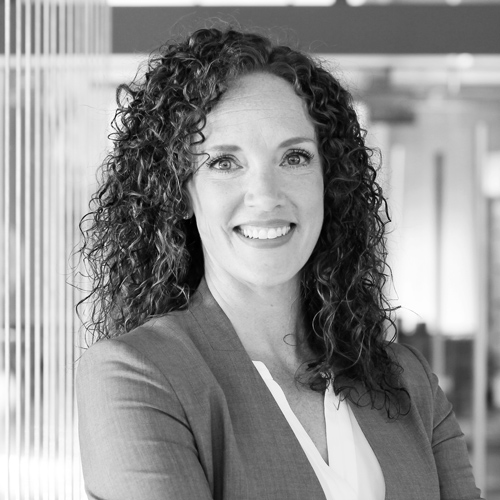Bill Deckelman stood on the New York Stock Exchange balcony on April 3, 2017. He was ringing in the day’s trading with the executive team of DXC Technology, a newly minted Fortune 200 company born from the merger of CSC and a large division of Hewlett-Packard. For most general counsel, a limited playbook of options heightens the challenge of integrating two large legal departments. Usually, the law department does not have the resources, or the mandate, to achieve real transformation.
Deckelman saw an opportunity to break a code that has long dominated the legal profession—and quickly move DXC’s legal-services model in a new direction. “Part of the code is an understanding that many of the big-name law firms, based on historical reputation or pedigree, get a disproportionate share of serious legal work,” Deckelman says. “Another part is the assumption that transformation is really for the business units of the company—not for legal.”
After a merger, most general counsel are left trying to do “more with less” rather than really transforming the delivery of legal services. But this is 2017, and DXC is a fast-moving player in the tech industry. “We needed to be faster and better than that; we had to break from traditional practice,” Deckelman says.
In his view, the modern law department is about being more nimble and less constrained by fixed costs, while also being better at matching the right skill to the right task. And of course, leaning on DXC’s own culture, it’s about using technology and process to drive value.
Months before the merger closed, DXC turned to two trusted advisors—AdvanceLaw and UnitedLex—to help the legal team execute two essential, strategic, and surprising moves, which were regarded as too risky by some.
For outside counsel transformation, AdvanceLaw helped flip the legal profession’s past practice on its head by conducting performance-based counsel selection at a true global scale. And to address DXC’s now-very-large in-house legal group, UnitedLex led the largest managed-services legal transaction ever performed.
In both cases, the goal was to leapfrog to a new model of legal-service delivery: Legal 2.0. “We never had second thoughts on the direction, but I also did not know how things would precisely unfold,” Deckelman says. “We all needed to trust each other and challenge ourselves to re-think assumptions. It was a lot of work, but it stimulated a mental shift, and it’s getting us the results we need.”
A Bespoke Legal Market
AdvanceLaw provides better outcomes for its general counsel and the law firms they select by:
•Bringing together a large group of major-company general counsel (180 and growing)
•Retaining innovative law firms that consistently deliver strong quality and efficiency
•Sharing performance feedback to give clients assurance and firms an incentive to excel
This model allows high-performing lawyers and firms to build credibility with every company in the AdvanceLaw network.
Outside Counsel Transformation
Deckelman had worked with AdvanceLaw in the past, and he knew they were right for this project. “AdvanceLaw exists to bring the kind of market discipline to law that most other sectors take for granted,” says Deckelman, who is one of AdvanceLaw’s general counsel. “It sounds so simple, but if you take market principles seriously, if you reward performance rather than pedigree, you’re going to end up changing how the legal profession fundamentally works.”
This was DXC’s goal: choose firms and lawyers based on actual performance, not historical pedigree. Counsel selection rarely happens this way. Big-name firms draw business based on brand recognition and risk aversion, gaining more market power (but sometimes becoming complacent) as a result. DXC needed the best counsel, eager for their work and with the company’s best interests in mind. So Deckelman wanted to leverage AdvanceLaw’s model to achieve this.
“A market only works well when performance information flows,” says Firoz Dattu, AdvanceLaw’s founder. “The legal market was missing that, which is why so many GCs banded together to form AdvanceLaw. In other markets, providers have a large incentive to improve and innovate because they are rewarded with greater market share as word spreads. That doesn’t really happen in the legal space, so we’re changing that.”
Deckelman took the wider AdvanceLaw model and customized it to DXC’s specific goals. With DXC’s approach, every matter above a stated value threshold is referred to AdvanceLaw staff for their analysis of which lawyer is “best fit.” Feedback is collected and shared on lawyer performance during and after the work is performed. Then law firms provide feedback on DXC’s performance. The goal is continuous improvement on both sides.
Plus, the best firms will not only earn a greater share of work from DXC but also get more work from the other 180 companies in AdvanceLaw. “We would essentially become a ‘super reviewer’ within the AdvanceLaw network,” Deckelman explains, “driving disproportionate market return to firms that truly deliver for us.”
Working closely with DXC to select the right strategic partner firms, AdvanceLaw avoided common pitfalls. “Some law firm panels are rubber-stamping exercises, some underperform because they’re created in a way that doesn’t enfranchise firms, and many fail to identify the best talent within the panel once it’s formed,” Dattu says.
To address these problems, AdvanceLaw used a novel RFP to see how a firm would staff and respond to realistic hypotheticals. Additionally, to avoid rubber-stamping incumbents, promising new firms were actively piloted during the RFP process so that selection decisions were based on actual performance.
“We want these firms to wake up every day excited about DXC and how to drive results for us, and that simply won’t happen if they’re treated like widget suppliers. They are counselors; they are a part of our team.”
Bill Deckelman
Deckelman and AdvanceLaw were also careful to ensure that the firms competing for spots on the panel were not just expensive, brand-name firms. “It seems like an obvious thing to do to drive quality and efficiency and limit complacency, but in practice it rarely happens,” Dattu says. “Quite frankly, and more than anything else, it was Bill’s strong leadership and vision that made this possible.”
In time, Deckelman plans to host a strategic partner firm summit. “We want these firms to wake up every day excited about DXC and how to drive results for us, and that simply won’t happen if they’re treated like widget suppliers,” he says. “They are counselors; they are a part of our team.”
The effect for DXC and its strategic partner firms is a thriving marketplace of legal services for a major consumer. “This is the revolution we were looking for,” Deckelman says. “The firms see the direct benefit of their focus and hard work, and DXC receives real benefit from that.”
Transformation through Technology
As a result of UnitedLex’s embedding abilities, DXC will be able to:
• Automate and track all contract-support requests to appropriate support resources via an integration with DXC’s CRM
• Provide a full end-to-end, leading cloud-based Contract Lifecycle Management Solution (CLMS) that will also drive automation and self-help for less complex support requests
• Provide a post-merger consolidated and searchable contracts repository
• Provide robust and timely reporting and analytics on DXC’s contracts portfolio
Riding the Digital Wave
The creation of DXC generated high expectations for how the company, literal to its name (D for digital, X for transformation and C for clients), would help its clients achieve a variety of objectives—including going digital.
Deckelman realized the law department needed to harmonize with DXC’s overall strategy and achieve aggressive targets in performance, cost, and risk. “I needed a holistic solution,” Deckelman says, “and UnitedLex was the only organization I knew of that could deliver that. They are decades ahead of the legal profession with their technology, processes, and overall approach.”
So, the challenge had been set: DXC’s in-house legal function would embrace “going digital,” which DXC champions for its own customers. UnitedLex began with a thorough review of every function, resource, process, and technology used within the combined law department. UnitedLex’s consulting, technology, and operations teams collaborated with Deckelman’s global leaders and key reports to design and implement a long-term solution consistent with his vision. The UnitedLex consultative approach matched well with McKinsey & Co.’s efforts that were focused on areas of DXC’s business other than legal.
The initial areas of UnitedLex’s focus included contracts, litigation, immigration, intellectual property, and legal operations. Given the variety and complexity of legal services to be provided to DXC, practice-of-law regulatory issues were another key aspect of the solution design. With more than twenty-six global jurisdictions requiring on-the-ground support, UnitedLex deployed an industry first: a unique collaboration with a specifically designed, global law firm to provide seamless, end-to-end legal support. The collaboration melded the best of breed from the law firm world and the world of technology and professional services, overcoming inherent limitations in their independent delivery models. Select attorneys, contract and commercial professionals, and other experts were rebadged from Hewlett Packard and CSC to UnitedLex and its designated law firm, and along with legacy professionals from UnitedLex, they formed the core team that is infused with DXC in-house professionals. UnitedLex currently deploys more than 250 senior attorneys, contract and commercial professionals, engineers, and other experts in support of DXC.
UnitedLex’s innovative design and execution allows DXC to reduce the number of required resources by more than 30 percent while enhancing operating performance to achieve robust goals. “It’s not just cost reduction,” Deckelman says. “It’s cost predictability and savings year over year; that’s a big thing UnitedLex delivers that traditional law firms just aren’t set up to do.”
An important additional component to the department’s efficiency and successful transformation is robust operational support, which Deckelman addressed by combining the leadership and expertise of UnitedLex’s Law Department Consulting team with the existing resources that rebadged from DXC to UnitedLex. UnitedLex has increased the range of support to the leadership team and department overall through a combination of process improvement, rigorous data analytics, and financial management.
The evolved DXC platform is perhaps the most progressive effort by any major law department to align with the business and drive needle-moving value capture. It’s also a major element of what Deckelman committed to accomplish for DXC. “Bill has earned the trust of many different constituencies to make his vision a reality versus an aspiration,” says Daniel Reed, CEO of UnitedLex.
Deckelman’s success doesn’t just matter for DXC’s customers, employees, and shareholders; his efforts have real implications for the broader legal marketplace, too. As lawyers of every kind look toward an uncertain decade ahead, they may find clues to their future in the continuing story of DXC’s global legal transformation.


